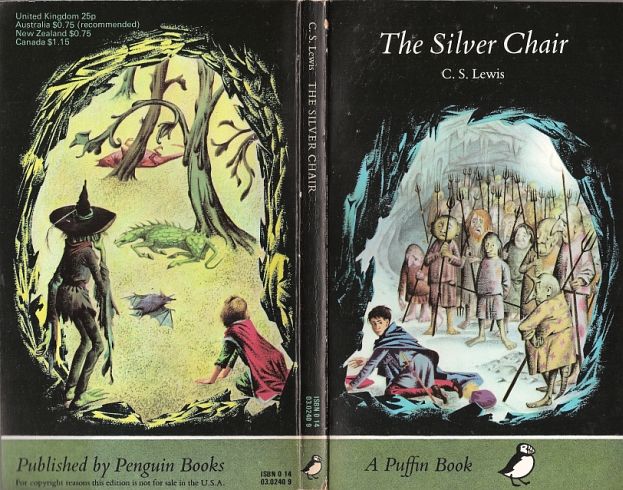
This past Wednesday, while teaching my latest Narnia session at my church, something struck me in a way it hadn’t before. I’m currently presenting and discussing C. S. Lewis’s The Silver Chair. We’re near the end (one week to go), and as I was reading aloud one of Puddleglum’s statements, the significance of what he said was more meaningful to me than ever.
It was in chapter eleven, while the spellbound Prince Rilian is tied to the Silver Chair to supposedly protect others from him. He’s been told that in that hour each evening, he loses his mind and needs to be restrained. In fact, that is the only hour each day when his right mind returns and he knows who he is. Aslan had given Jill four signs to follow in finding the lost prince. The final sign was “You will know the lost prince (if you find him) by this, that he will be the first person you have met in your travels who will ask you to do something in my name, in the name of Aslan.”

Puddleglum, Jill, and Eustace had promised not to untie this rather untethered (in his mind) young man while he was bound to the chair. Yet, at a crucial moment when they are trying to figure out if he’s really in his right mind, he cries out, “Once and for all, I adjure you to set me free. By all fears and all loves, by the bright skies of Overland, by the great Lion, by Aslan himself, I charge you.”
That startling statement, which apparently was the final sign Aslan told them to heed, raises a flurry of doubts and concerns. “It’s the sign,” Puddleglum immediately notes. Eustace, more dubious, merely says, “It was the words of the sign.” Jill, torn in both directions, can only say, “Oh, what are we to do? Oh, if only we knew.”

That is when Puddleglum’s true character comes to the forefront. Throughout the book, he has been, as the children called him, “a wet blanket,” always expecting the worst. But he also has increasingly been revealed as a source of stability, his trustworthiness his greatest trait.
“I think we do know,” he responds to Jill. Eustace questions, “Do you mean you think everything will come right if we do untie him?”
Puddleglum’s answer to Eustace is where I newly discovered a deep truth.
“I don’t know about that,” said Puddleglum. “You see, Aslan didn’t tell Pole what would happen. He only told her what to do. That fellow will be the death of us once he’s up, I shouldn’t wonder. But that doesn’t let us off following the sign. [emphasis added]
What’s so deep about this? Why did it strike me so feelingly? It’s a principle for the Christian life that applies to all of us. The Lord doesn’t tell us ahead of time exactly what will happen when He gives us a command. In fact, following Him often leads to further stress. His promise of peace is a promise that happens within us despite circumstances. When we are faithful to obey Him, there is never a promise that all circumstances will turn out wonderfully. In fact, division, rancor, and retaliation may come in the wake of our faithful witness.
The bottom line for Puddleglum was that no matter what happened by following Aslan’s instructions—even if what happened was outwardly negative—those were Aslan’s instructions regardless.
The bottom line for us is no different. If we know the Lord has given us His Word, we are to follow it no matter where it leads. No fear of what might happen is to deter us from our obedience to Him.
Isn’t it amazing what an adult can learn, or be reminded of, in a story that’s supposedly meant for children?
